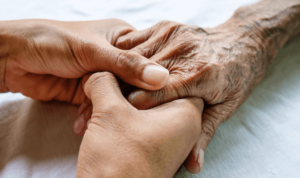Get Help Managing Diabetes in Nursing and Care Homes
If your loved one has diabetes and requires nursing home care, you’re not alone. Many elders with diabetes turn to nursing homes so they can get high-quality diabetic care.
While the management of diabetes can be hard, long-term care facilities have the ability and duty to care for diabetic residents.
“Due to the high morbidity and disability level among diabetes patients in nursing homes, the conditions for caregivers are exceedingly complex and challenging.”
— BMC Nursing
An elderly person with diabetes can suffer from life-threatening health risks if they are not given proper care and treatment at a nursing home. Sadly, cases of diabetic residents suffering from nursing home neglect and abuse are all too common.
Get a free case review if your loved one suffered from improper diabetes care in nursing homes. Compensation may be available.
Issues Related to Diabetes Care in Nursing Home Residents
Diabetes care in nursing homes is a complicated issue. Older people who have diabetes may have higher rates of other physical problems. Elderly diabetic patients may also be at risk of mental health problems like depression, according to the Journal of the American Geriatrics Society.
Seniors with diabetes run an increased risk of:
- Alzheimer’s disease and other cognitive impairments
- Amputations
- Cardiovascular disease
- Depression and anxiety
- Falls
- High blood pressure
- Strokes
- Urinary incontinence
- Other chronic diseases
- Lower life expectancy and death
For these reasons, it’s no surprise that older adults with diabetes go to assisted living facilities when they become unable to take care of themselves, yet patients can still suffer if diabetes care in nursing homes is poor.


Elderly Diabetic Care in the Nursing Home
The goal of diabetes care in nursing homes is to maintain normal blood sugar levels (glycemic control). Too much blood sugar (hyperglycemia) or too little (hypoglycemia) can cause elderly patients to suffer.
Staff, diabetic nursing home patients, and families can work together to create a health care plan to ensure the best quality of life.
What Should a Diabetes Care Plan Include?
Care plans outline everything that staff members need to know so they can best meet the resident’s health needs. Care plans should be uniquely tailored to each resident while covering all the major components of diabetic care.
Nursing home diabetes management plans should cover:
1. Blood Sugar Monitoring
Diabetic nursing home residents must have blood sugars within a normal range and with little variability. Nursing home caregivers need to use a glucose meter to monitor the blood sugar levels of residents.
Testing can vary depending on the type and severity of diabetes. The Mayo Clinic notes that those with type 1 diabetes will need to be tested 4 to 10 times per day. Type 2 patients that need insulin typically need to test their blood sugars between meals and before bed, according to the Mayo Clinic.
2. Diabetic Medications
Insulin injections and other diabetes medications can keep diabetic nursing home residents’ blood sugar levels stable and within normal range.
Nursing home staff must ensure that the diabetic resident gets all their medications. If the staff makes medication errors, the resident can suffer serious harm.
3. Nutrition of the Diabetic Patient
Beyond monitoring blood sugars, elderly diabetic patients need to stay at a normal body weight. Thankfully, the body weight of diabetic patients can be kept in check through diet changes.
Nursing home staff may need to monitor how much the diabetic resident eats and help them choose good foods to eat that follow their care plan. For example, staff may need to limit the amount of fat, carbohydrates, and cholesterol in a nursing home resident’s diet.
Food also needs to be given after insulin injections to avoid severe spikes or drops in blood sugar.
4. Other Considerations
Care plans may also include:
- End-of-life care: If a patient becomes terminally ill, there should be a plan to monitor their blood sugar closely to prevent or reduce complications from diabetes.
- Foot checks: The Centers for Disease Control and Prevention (CDC) recommends that diabetic patients check their feet every day for redness or other injuries. Diabetic patients often suffer from numbness or nerve damage in their feet, putting them at risk of bedsores. In a nursing home setting, staff may have to perform these checks on the resident’s behalf.
- Infection control: If blood sugar monitoring tools or insulin injections are used by more than one person, bloodborne viruses like hepatitis B can spread. The CDC notes that these outbreaks are more common in long-term care facilities. Needles should never be shared by more than one patient.
- Protocol for falls: Hypoglycemic patients have a higher risk of falling. The ADA notes that low blood sugar can put diabetic people off balance, meaning they can fall more easily. Balance training can help residents reduce the risk of falls, according to the Journal of the American Medical Directors Association.
Nursing home residents can be seriously harmed if their diabetic care plan is not closely followed. Get a free case review if you believe abuse or neglect harmed a loved one — compensation may be available.
Poor Diabetic Care and Nursing Home Neglect
While all skilled nursing facilities are expected to provide high-quality care, sometimes staff members actually wind up harming diabetic residents. Whether it’s a simple mistake or an intentional act, all forms of nursing home abuse can greatly harm residents.
Examples of diabetic nursing home neglect include:
- Failing to provide regular health care updates to family
- Not assessing risk factors for blood sugar spikes or dips
- Not feeding a resident after insulin injections
- Not administering regular insulin injections
- Not providing emergency diabetes treatment for complications
A real-world example of poor diabetes care in nursing homes almost killed a woman. She was not given food after receiving insulin shots, and her daughter found her unresponsive hours later with extremely low blood sugar and a low heart rate.
This was only one of many health scares the woman had suffered in the facility. She had also fallen out of bed, wasn’t promptly tested for a urinary tract infection, and suffered from wounds that went untreated until family members pointed them out to staff.
With help from a nursing home abuse lawyer, the woman and her family were able to receive a large financial payout.
Nursing Home Neglect Lawsuits for Improper Diabetic Care
Poor care of a diabetic person in a long-term care setting can result in serious or deadly complications. Thankfully, a nursing home abuse lawsuit can help you take justice against those who harmed your loved one.
A successful nursing home abuse lawsuit can force long-term care providers to compensate you for your loved one’s injuries.
Compensation from a lawsuit can pay for:
- Costs of moving your loved one to a safer facility
- Lost wages
- Treatment costs
- Other expenses (funeral bills, counseling, etc.)
These lawsuits can also encourage the facility to improve its care and/or remove abusive staff so other diabetic residents aren’t harmed.
Nobody should have to suffer from poor treatment while living in a nursing home. If a diabetic loved one was the victim of nursing home abuse or neglect, we can help you take legal action. Get a free case review today to start the process.
FAQs on Diabetes Care in Nursing Homes
What is the prevalence of diabetes among nursing home residents?
Many nursing home residents suffer from diabetes. On average, 18.5% of nursing home residents — almost 1 in 5 — are diabetic.
Regarding diabetic care, what constitutes neglect in a nursing home?
Many issues can be considered neglectful diabetes care in nursing homes. Failure to monitor a patient’s blood sugar levels, not feeding residents after insulin injections, not caring for wounds, or not monitoring diabetic patients at risk of falling may all be considered neglect.
Our team can determine if a diabetic person you love suffered from neglect in a nursing home. Call (855) 264-6310 to start the process.
How can I get help for poor diabetes care in nursing homes?
Call 911 if a diabetic person you love is in immediate danger. You can also contact a nursing home ombudsman if you think your loved one is not being cared for.
Finally, you can get legal help for poor diabetes care in nursing homes by contacting a lawyer. Start the process today with a free case review — compensation may be available for you and your loved ones.






